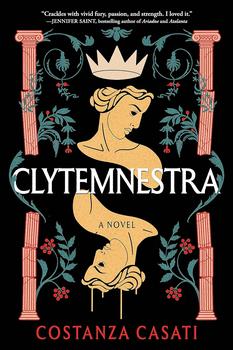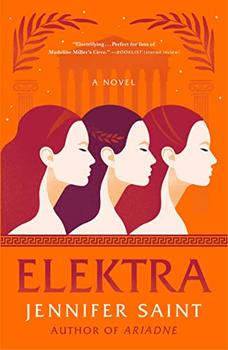Summary | Excerpt | Reviews | Beyond the book | Read-Alikes | Genres & Themes | Author Bio

A Novel
by Caro De RobertisWhen male suitors intended for her older sisters spread a rumor that Psyche's beauty surpasses that of Aphrodite, the Greek goddess of beauty herself, Psyche is forced to endure the daily crowds of men that show up to ogle her. Their unwanted attention draws the ire of her father for draining his resources as a host and the jealousy of her sisters. The disruptions are so widespread that the entire town blames Psyche for its poor harvest. Desperate for an end to these problems, Psyche's father consults the oracle, who instructs that Psyche be tied to a rock and abandoned to her demise at the hands of a "monstrous" husband — who turns out to be Eros, the nonbinary goddess of desire in this retelling. Defying the orders of her jealous mother, Aphrodite, lovestruck Eros interferes with the oracle's prophecy and sequesters Psyche in her palace, which is magically veiled from the reproachful gazes of the gods. There, Eros and Psyche create a passionate, transgressive love of their own. But this love is threatened by Eros's insistence that they meet under the protective cover of night and darkness, as Psyche begins to yearn for the sight of her husband in the light.
The prose in The Palace of Eros features stunning lyricism, particularly in the chapters written from Psyche's first-person perspective. Persisting in voicing her own story, Psyche's descriptions are built upon earthy and sensuous imagery connecting the physical body to the natural world:
"When men came, my world shattered—but before that, I was unafraid, and I knew joy ... In the ease of sinking my body into the cool scope of a tree, oak or olive, fig or pine, blended into them, until I felt my roots deep in the earth below and my head green with leaves reaching greedily up to the sun. In the rich murmur of rain against our roof, spilling tales from the heavens, a wet weeping and laughter of secrets I longed to translate or swim into with my human mind."
This rapturous female interiority expands as, within Eros's palace, Psyche attains a greater sense of selfhood through exploring her desires away from the gazes of men. Female sexuality, physicality, and pleasure in one's own body (traditionally taboo) are treated with sensitive, no less poetic frankness and intimacy. Entitled "Palace," the revelatory Part Two of the novel luxuriates in how an electrifying touch of Psyche's hair by Eros's gentle hand and nights of Eros's beautiful singing at Psyche's request promise and, indeed, escalate into a deep intimacy: a mutual exploration of the female body that defies imposed gender binaries; a growing sense of union and freedom inside a home filled with luxury and art set in a valley of abundant nature; and the growing sense that sight, the intimate knowing of another's soul and body, is possible, divorced from the realm of the violating male gaze.
Within this context of femininity and soulful physical intimacy, Caro De Robertis's novel does the paramount work of representing nonbinary gender identity and gender fluidity, presenting a viable alternative to the heteronormativity of the traditional Greek myth in which Eros is strictly male. Here, Eros is introduced as a goddess; she is consistently addressed and refers to herself with feminine pronouns. Yet, her fluidity is established early on as Eros adopts the traditionally masculine role of "husband" with Psyche as her "wife." Doubling down on Eros's nonbinary womanhood — while admitting with a modern sensibility that language can never fully encapsulate Eros, Psyche, and their love story — are explicit descriptions of how she is "more-than-woman-yet-still-woman in a manner that defied the laws of gods and men." With deep empathy, Psyche also reaches out directly to the queer community and those with unvoiced identities in the shadows: "I want to reshape the world in hopes there would be a future time, a future place, in which you could exist … You who refract the sunlight in new ways through the secret prisms of joy. You who might see a flash of yourself in my story with Eros. You who were born perfect yet outside the rules of whatever temples oversee your times. You whose desire shatters the cage. You, born hundreds or thousands of years from this moment by the sea."
Eros's titular palace is a much-needed safe space from a world of men that consumes Psyche's beauty for its own lascivious purposes as well as a universe overseen by gods that impose edicts against the free expression of Eros's nonbinary identity. But at what point does a redemptive safe space, undeniably crucial to the lovers' development, become a gilded cage? As Demeter, goddess of agriculture, pointedly states during her meeting with Eros, "Impose too many rules, and any palace becomes a prison. Most wives live that way, imprisoned." She raises a poignant and open question hinting at the drive towards acceptance and complete sight in the light of day that rises to the forefront in the final parts of the book: "'What if your freedom place could be larger than one room?'"
In addition to Demeter, there are several other cameos featuring silenced women from Greek mythology. Psyche feels compassion for Persephone, the raped and kidnapped daughter for whom Demeter grieves. She paints a portrait of Daphne, identifying with how her transformation into a laurel tree saved her from being assaulted by Apollo yet ensured she remained forever rooted: "She would not be raped, but she would lose her body. She would be safe; she'd never be free again." These captivating episodes interwoven into the main romance between Psyche and Eros raise the potential for powerful unity between women and other marginalized characters, with Psyche considering, "Persephone might well take me as a sister-friend." Expanding the scope of the book, these one-shots suggest an underlying, subtly-interconnected underworld of untold stories and queer perspectives. These sections offer fertile ground for De Robertis to write additional retellings or other stories with similar themes in the future.
Alongside this fascinating weave of encounters primarily occurring in the final sections of The Palace of Eros, the frustrations and unspoken desires between Eros and Psyche resulting from the restrictions placed on them by men and male gods are perhaps unraveled too quickly through single chapter-length conversations of relative brevity or dramatic pronouncements revealed secondhand in dialogue. This quickened pacing sits in stark contrast to the lengthy care gone into building their relationship in the first two-thirds of the book. Nonetheless, The Palace of Eros remains heartfelt and hopeful with qualified optimism for a more accepting future for women, queer people, and nonbinary people, all while retaining its choric lyricism.
![]() This review was originally published in The BookBrowse Review in September 2024, and has been updated for the
July 2025 edition.
Click here to go to this issue.
This review was originally published in The BookBrowse Review in September 2024, and has been updated for the
July 2025 edition.
Click here to go to this issue.

If you liked The Palace of Eros, try these:

by Costanza Casati
Published 2024
Madeline Miller's Circe meets Cersei Lannister in a stunning debut following Clytemnestra, the most notorious heroine of the ancient world and the events that forged her into the legendary queen.

by Jennifer Saint
Published 2023
A spellbinding reimagining of the story of Elektra, one of Greek mythology's most infamous heroines, from Jennifer Saint, the author of the beloved international bestseller, Ariadne.
Your guide toexceptional books
BookBrowse seeks out and recommends the best in contemporary fiction and nonfiction—books that not only engage and entertain but also deepen our understanding of ourselves and the world around us.